No Contests But One
At least they chose an outstanding venue.
Eye Of The Tiger Management put on a boxing gala on Saturday at The Olympia, the historic theatre in downtown Montreal, built in 1925 as a movie house. All 1,302 tickets had been sold, though the scandal surrounding the cancellation of the main event due to David Lemieux’s failure to make weight had cast a pall over the show. The pall, however, somehow fit with The Olympia’s interior of decaying beauty, its antique red walls and tin ceiling festooned with gold floral patterns. The ring had been placed below the stage, which served as a VIP area with table service, on either side of which hung a giant flat screen television. The set-up and the vintage look of the venue gave the proceedings an air of sophistication.
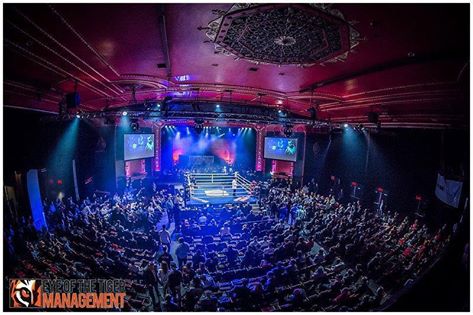
As the first fight started, The Olympia was two-thirds empty, the ambiance funereal. The announcer stood in the center of the ring wearing a white tuxedo, his immaculate coiffure caked in hairspray. He did a fine Michael Buffer impersonation as a fit young woman in a black and orange bikini and stilettos cat-walked around the ring, holding up a sign for round one. Nobody was looking at the sign. She was more naked than the fighters, after all, two super lightweights and local prospects whose brief encounter helped to lower our expectations. Redy Hernandez wore his long dreads up in an Afro-Samurai bun and his skinny legs were tottering even before the match had started. Batyr Jukembaev quickly demonstrated his superior strength and skill, which is to say, Hernandez had neither.
Disgusted with his feeble opponent, Jukembaev grabbed him by the shoulders and threw him onto the mat and when Hernandez got up he was wincing and hopping around on one foot. The tiny crowd jeered at him with mock-sympathetic cries and even Jukembaev and his corner were howling. A gentleman sitting in the row behind me with the brim of his baseball cap perched on the side of his square head, a cup of beer in his fat fingers, yelled, “You done, bitch! You done!” The fight was declared a “no contest” due to Hernandez having suffered an injury in his fall and indeed, there was no contest.
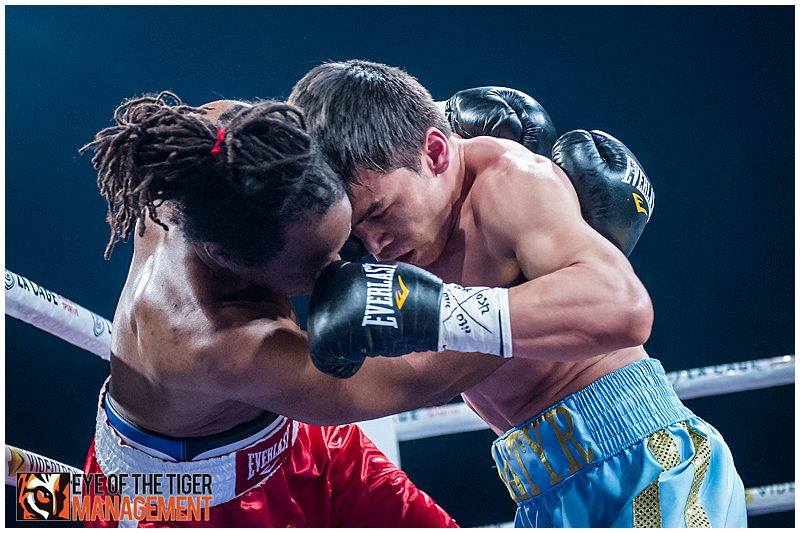
By the time the second fight had begun the theatre was half-full and the drone of hundreds of voices could be heard over the drone of techno music supplied by a DJ in the center of the theatre. And yet little excitement filled the air; instead I saw mostly bored-looking faces lit up by smart phones, few paying attention as super lightweight and hometown favourite Mathieu “G-Time” Germain faced off against Mexican Noel Rincon.
Rincon went the distance of six rounds but endured a savage beating, proving his toughness and earning the crowd’s respect. Germain displayed an impressive boxing acumen, always moving forward, cutting off angles, throwing combinations to head and body. In fact, one of his body blows briefly lifted spectators’ eyes from their phones, a straight left to Rincon’s stomach, which made a thunderous smack, the crowd yelling “Oh!” and some rising to their feet. Germain won a unanimous decision and as the two boxers hugged each other, the crowd gave them the show’s first collective round of applause.
The intermission between the second and third fight, like the one between the second and first, seemed excessively long. Furthermore, between rounds the audience was subjected to blaring music too loud for anyone to have a conversation over, eliminating what enthusiasm might have been generated by talking about the fights, and so everyone stared into their phones.
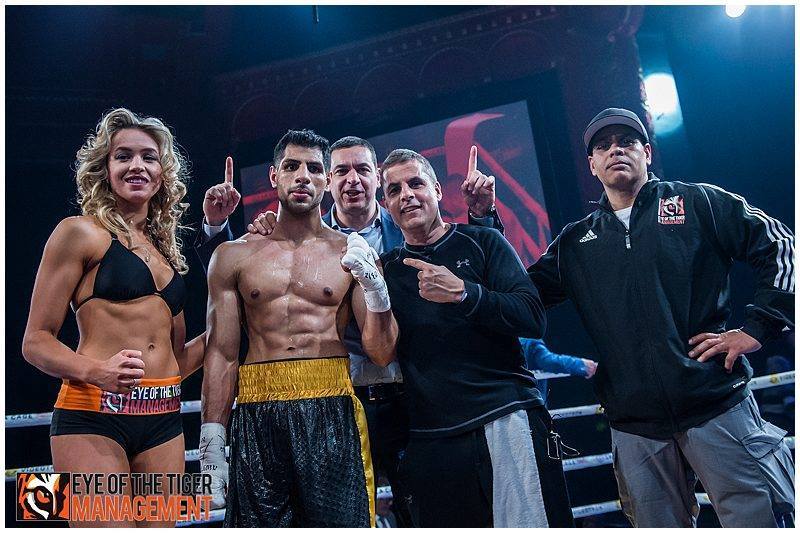
By the time the third bout began, the theatre was two-thirds full and the diverse character of the crowd had taken shape: white, black, Asian, Middle Eastern, Latin American; young hip-hop enthusiasts with lean muscular bodies and low-hanging pants exposing designer boxer shorts; skinny effete boys with checked shirts and tiny moustaches; girls dressed like high-powered attorneys in tweed skirts and leather high-heel boots; middle-aged working-class men and women with tight shirts over bulging pecs or silicone breasts and draped in gold jewellery; couples and families and groups of friends; males and females, young and old. The varied and inclusive crowd on display belied the cliché that boxing fans consist primarily of men drunk on booze and bloodshed.
The next fight was another mismatch as super lightweight Ayaz “The Machine” Hussain demolished Poland’s Jacek Wylezol. In the second round the powerful Hussain clocked Wylezol in the head with a clean right hook and the stricken man collapsed on his hands and knees. The fight ended shortly thereafter and was followed by yet another mismatch as local heavyweight Simon Kean clobbered American Travis Fulton, whose record of 23-41 didn’t bode well for his chances, nor did the flabby gut hanging out of his trunks. When the announcer said his name, the crowd hissed and instead of raising his fist in defiance, Fulton shrugged his shoulders, as if to say, “Yes, I’m a punching bag.” The square-headed man nearby, now on his fifth pint of beer, slurred, “This’ll be done in ten seconds! This is some bullshit, man! Finish him!” Fulton did have one thing going for him: a sturdy chin. He must have withstood a dozen clean head shots before Kean finally “finished” him.
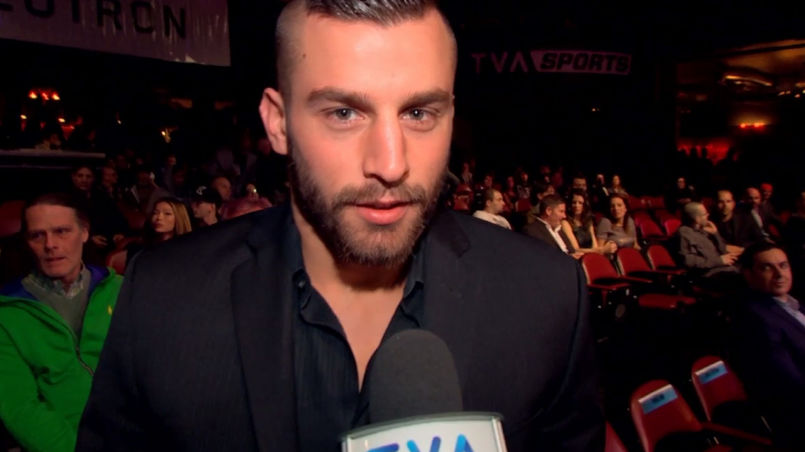
By this time the theatre had filled to capacity, but the swollen crowd continued to look bored and impatient as they waited and waited for the next fight, though many were pleased by the chance to have their picture taken with David Lemieux. There he was ringside, looking handsome in a black suit and pointy-toed shoes. Many of the men in attendance had dressed exactly like Lemieux and copied every detail of his look, right down to his manicured stubble and shaved head topped with a shock of long, slicked-back hair. But when Lemieux entered the ring to say a few words, he got just as many boos as cheers. He smiled sheepishly, apologized for missing the weight limit and promised to make it up to the fans in the near future, before leaving to the sound of meagre applause. In fact, by then most of the audience had long since stopped paying attention and turned back to their phones.
Fans, however, went crazy when some fit young women in tight black tops, stilettos and orange shorts with “Eye of the Tiger Promotions” emblazoned on their asses, started tossing out free t-shirts. In fact, free t-shirts excited them far more than any of the fights. The drunk gentleman nearby threw a fit because no t-shirt had been thrown at his seating section and each time he screamed the word “shirt” or “fuck,” beer spittle tickled the back of my neck. I turned around to look up at him and saw his girlfriend scowling down at me. She had tattoos up and down her arms and a black leather mini skirt with matching stilettos. I turned back to the ring just as one of the women in orange hot pants bent over the edge of the press table in front of me, crushing my pen and notebook under her washboard stomach to graciously deliver bottles of water to reporters.
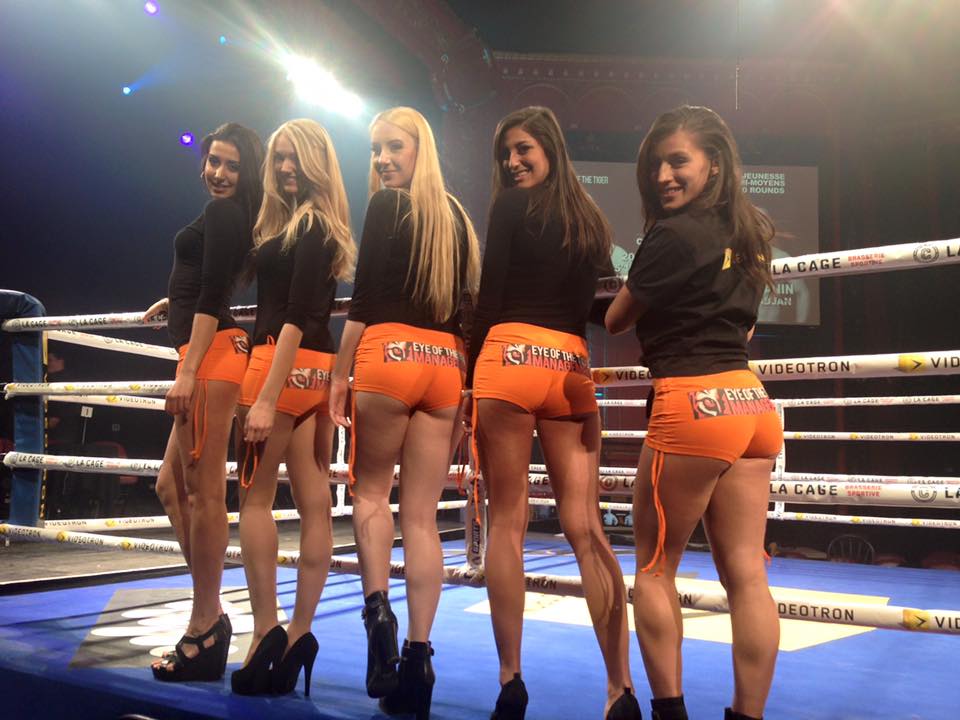
The fifth bout offered yet another mismatch, this one between super welterweight Montrealer Mian Hussain and Italian Tobia Loriga. Loriga looked pale and malnourished with spiky blond hair and a puckered face; throughout the fight he had to keep pulling up his trunks. The match went the distance and while Hussain dictated the action through all six rounds, he also spent too much time doing nothing, his performance the least inspiring of all the winning fighters. Loriga appeared weak and wobbly and kept getting swatted around like a fly by Hussain’s power punches, though he did provide some comic relief when, after the bell had rung to end the final round, his face and body swollen and red, his mouth and nose bleeding, he looked out at the crowd, gave an ironic smile and pumped his fist in victory. The fans around me laughed hysterically.
It would be at least a half hour before the next bout, so I made my way to the restroom, having to burrow through a horde of burly Lemieux look-alikes who’d jammed into the foyer between the two bars. None of the Lemieux clones would budge as I tried to politely squeeze between them, so I found myself getting pushed around and felt their tiger eyes bearing down on me, maybe because the press pass hanging from my neck showed that, unlike them, I hadn’t paid to watch this parade of mismatches.
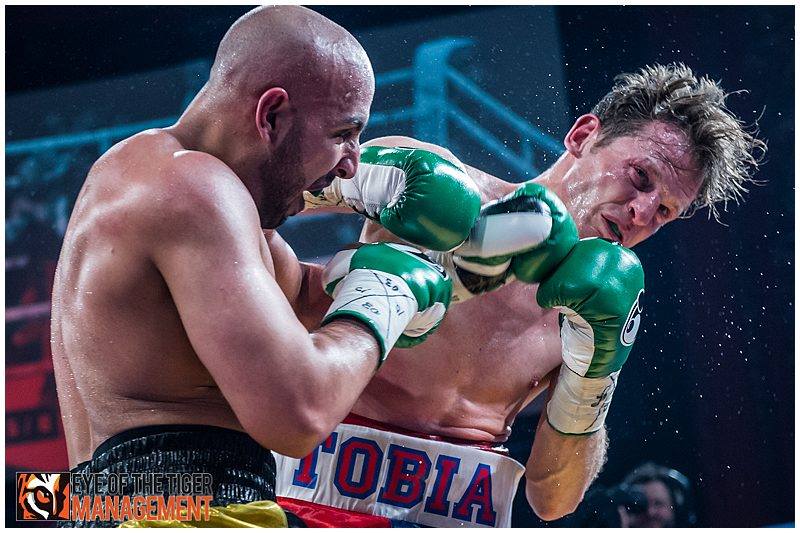
Thus the fierce competitiveness of the next fight came as a welcome surprise as undefeated super middleweight and local hero Schiller “Batman” Hyppolite battled American Darnell “Deezol” Boone. The tense back-and-forth shifts in momentum in this hard-fought match finally woke up the tepid crowd, negating what had seemed a bad omen for Hyppolite when he entered the ring: crouching between the ropes, he tripped and almost fell. He’s going to lose, I thought, but by the end of round three he had the edge, though Boone wasn’t far behind, his laid-back counterpunching style somehow more intimidating than Hyppolite’s aggressive forward movement. Boone’s punches looked harder and crisper than his opponent’s, as if all he needed were one clean blow to drop Schiller for good.
And then in the fifth round Boone finally knocked him down, in a manner reminiscent of the finale of Rocky II: like Creed and Balboa, Hyppolite and Boone hit each other and fell at the same time, but only Boone had struck a clean shot. He jumped to his feet right away while a dazed Hyppolite stumbled about trying to get up. Unfortunately for Boone, only a few seconds remained in the round; had he landed the same punch earlier, he might very well have ended the fight. But the tables had turned and now Boone was in control. The crowd rose to its feet, cheering at a deafening volume, and for the first time it felt like I was at an exciting boxing event instead of a funeral. Boone struck again in round six, forcing the referee to deliver a second eight count to a stunned Hyppolite.
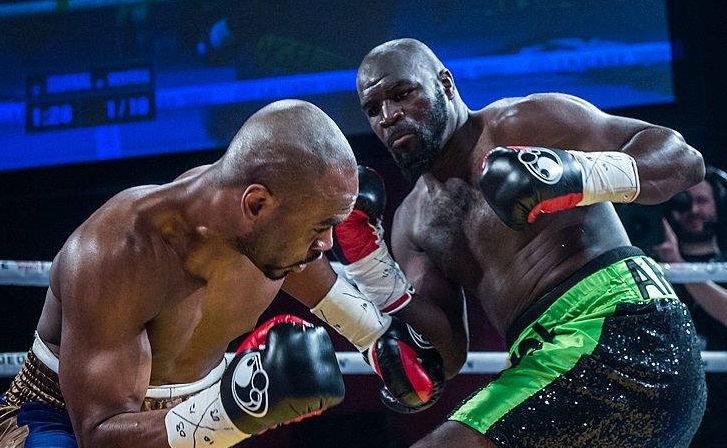
Round seven started and it seemed that unless Hyppolite could knock Boone out, there was no way he would win, but he managed to control the last three rounds and in round eight even landed a gorgeous left hook to Boone’s head that made the veteran’s knees buckle. But he wouldn’t fall. Boone had an iron chin and could take anything Hyppolite threw at him. He wore a zen-like facial expression and long pointy goatee and fought with a cool, methodical patience. Would he find the right moment to deliver the fatal blow? It almost seemed inevitable, despite the fact that Hyppolite was pressing hard for a knockout, the crowd howling Ooooh! each time he landed a punch to Boone’s head, bloody sweat spraying in all directions.
The final bell rang and The Olympia erupted in a standing ovation as the weary battlers embraced and smiled, knowing they’d given the kind of excitement the rest of the dreary night had failed to offer. But when told the house fighter had won a unanimous decision, the crowd fell oddly silent, perhaps because they knew that Boone deserved the win. Hyppolite, the more sophisticated tactician, threw more successful combinations but only one of his punches had fazed Boone. Meanwhile the veteran had landed a number of telling shots, knocked Hyppolite down, and more than once sent him staggering into the ropes. Boone scoffed and shook his head at the decision as Hyppolite hugged him again and smiled nervously, conveying a tacit acknowledgement that he knew he was fortunate to get the verdict. Still, Boone had earned the respect and admiration of the crowd, and in this humble reporter’s opinion, was the star of the show.
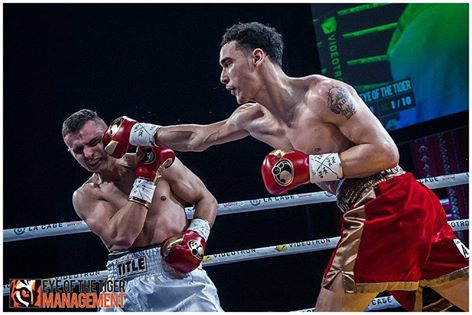
The last fight and new main event, for the IBF Youth Super Welterweight title, between Bosnian Sladjan Janjanin and local rising star Steven “Bang Bang” Butler, unfortunately represented a return to one-sided action. Butler trounced the Bosnian in three rounds that could hardly have been less competitive; I’m not sure if Janjanin landed a single meaningful blow. By the third round, he’d resorted to crouching down against the ropes in a fetal ball, his arms over his head as the talented hometown fighter pummeled him mercilessly. The crowd shouted, Butler! Butler! Butler! as he easily dodged several in a row of Janjanin’s powerless punches and then connected with a series of brutal head shots. The pattern kept repeating and the crowd laughed as Butler toyed with his opponent, until the referee finally ended the slaughter.
While fans cheered over their hometown hero and his new IBF title belt, I quickly left the venue before a promoter could take the microphone and offer any final remarks, because I suspected that he or she wouldn’t say anything like: “Ladies and gentlemen, we apologize for providing only one contest worthy of your enthusiasm. We apologize for the star of the show not being able to compete. We apologize for matching our boxers against far inferior opponents. We apologize for making you wait interminably long periods of time between fights. We apologize for playing music so loudly it was impossible for you to talk about the lack of entertainment you were witnessing. In short, ladies and gentlemen, we’re sorry for putting on a show that fell somewhere between mediocre and lousy. We promise to do better next time.” — Marko Sijan



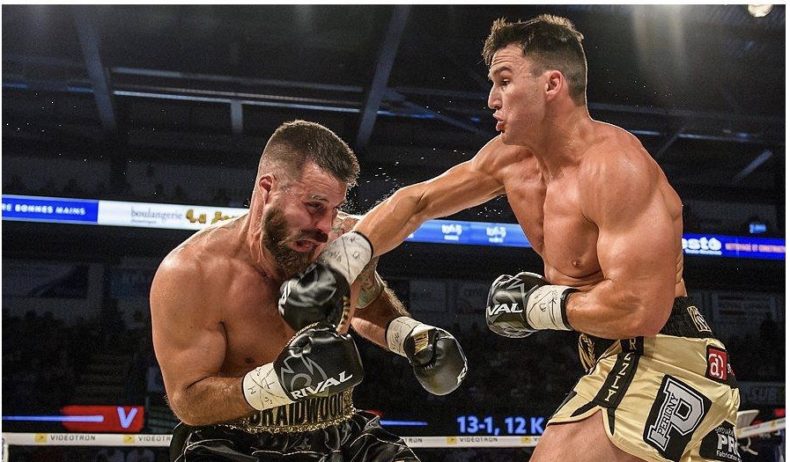

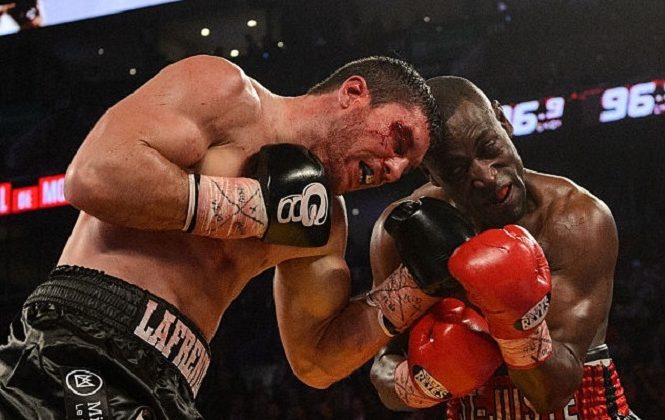
Hope you got a gold star in your creative writing class and the next assignment is one of reporting, not stylized fiction.